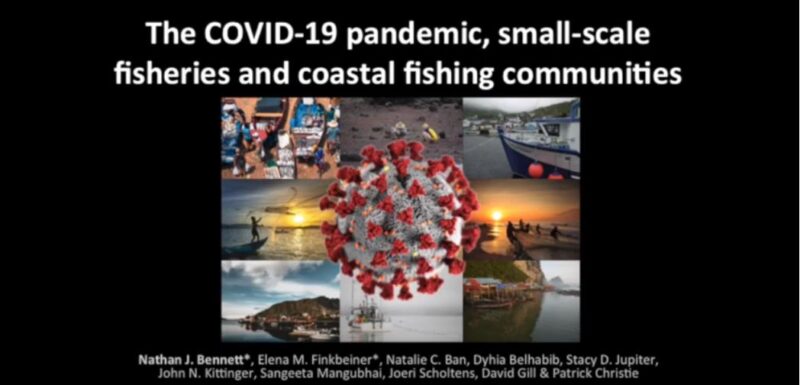How small-scale fishers are struggling amid COVID-19 crisis
As COVID-19 affects global food systems, tremendous impacts are being felt by coastal communities and small-scale fishers, many of whom are self-employed and rely on the catch to feed their own households or local communities.
In a review published in Coastal Management, researchers explore the impacts of the COVID-19 crisis on small-scale fisheries in Canada and worldwide, and provide recommendations on how to support them.

We spoke with lead author Nathan Bennett, research associate with the Institute for the Oceans and Fisheries at UBC, and Chair of the People and the Ocean Specialist Group for the International Union for the Conservation of Nature (IUCN), about the findings.
COVID-19 has negatively impacted economies across the globe. Why is your focus on small-scale fisheries so important?
NB: Globally, there are approximately 32 million people directly employed in small-scale fisheries with an additional 76 million who process and market this catch. Most of the catch from these fisheries – up to 81 per cent according to World Bank figures from 2012 – is used for local human consumption. Especially in the developing world, coastal communities are highly dependent on fish for protein. Yet there is a tendency to underplay the importance of small-scale fisheries for livelihoods and their contribution to food security and they are often ignored by governments. We are worried that they are also being highly impacted and not getting the assistance they need during the COVID-19 crisis.
In what ways has the small-scale fishing industry been affected?
NB: Our team of international researchers were, unfortunately, unable to go into the coastal communities to evaluate how the COVID-19 pandemic is impacting the small-scale fisheries sector because of mobility restrictions. We turned, instead, to media accounts and other public sources of information. Much of the news was bleak. In Canada, for example, we heard that demand was way down for lobster, crab, halibut and many other fish. Indigenous fisheries, such as the Heiltsuk herring roe-on-kelp fishery, have also collapsed. Prices have fallen so low that many fishers cannot afford to leave the dock or were selling at a loss. Many fishers are staying home, even at a time when many Canadians are in need of food. Many who work in processing plants are out of work. The economic impacts are being felt in coastal communities across Canada.
Worldwide, the impacts have also been mostly negative for small-scale fisheries. At the beginning of the COVID-19 pandemic many fisheries faced complete shutdowns as they were not considered vital to national food supply systems. Ports, markets and processing facilities were also closed due to the close quarters and risks of spreading COVID-19. Export-oriented small-scale fishers faced a vast reduction in demand and slashed prices. Even in fisheries that remained open, people had to make difficult decisions about feeding their families or risking exposure. Some groups, such as migrant workers and women – who comprise 80 to 90 per cent of the post-harvest sector – are bearing the brunt of the pandemic.
We also found some positive outcomes, such as fishers going out and then sharing food in their local communities. There has also been an increased demand for fish from community supported fisheries such as Skipper Otto in Vancouver. Home delivery systems and online fish sales platforms have boomed as far away as South Africa, Mexico, and Ghana. Across North America, the Local Catch Network has created a public registry of community supported fisheries and local harvesters from whom locals can buy seafood directly. More broadly, small-scale fishers are working to safeguard their livelihoods and access to food. Many civil society organizations are working with local and regional governments to mitigate impacts of the closures and to develop guidelines for safe and equitable re-opening of small-scale fisheries.
When this pandemic is over can we go back to business as usual for small-scale fisheries? Will things need to change?
NB: While the crisis is still unfolding, there is an urgent need to mobilize support for small-scale fishers and coastal fishing communities. A collective response is needed to meet the scale of the negative impacts that are being experienced by the small-scale fisheries sector. The voices of local fisheries and communities must be engaged when designing responses to this situation. Specific support is needed for vulnerable and often neglected groups, such as migrant workers and women.
Yet, there is also a danger that some organizations will promote oversimplified solutions based on pre-existing agendas or worldviews that do not align with local contexts. Responses to the COVID-19 pandemic must not undermine Indigenous and local people’s rights to harvest, consume and sell fish from their waters.
We must act now to help mitigate the worst impacts of COIVD-19 on small-scale fishers. Governments, development organizations, NGOs, donors, the private sector, and researchers all have a role. In the long run, support will be needed to help rebuild the capacity and resilience of small-scale fisheries and coastal fishing communities.
**Reposted with permission from The University of British Colombia**
Katherine Came
Communications Manager
Institute for the Oceans and Fisheries
Email: k.came_at_oceans.ubc.ca
Office: 604-827-4325
Sachi Wickramasinghe
Multimedia Specialist
UBC Public Affairs
Email: sachi.wickramasinghe_at_ubc.ca
Office: 604-822-4636
